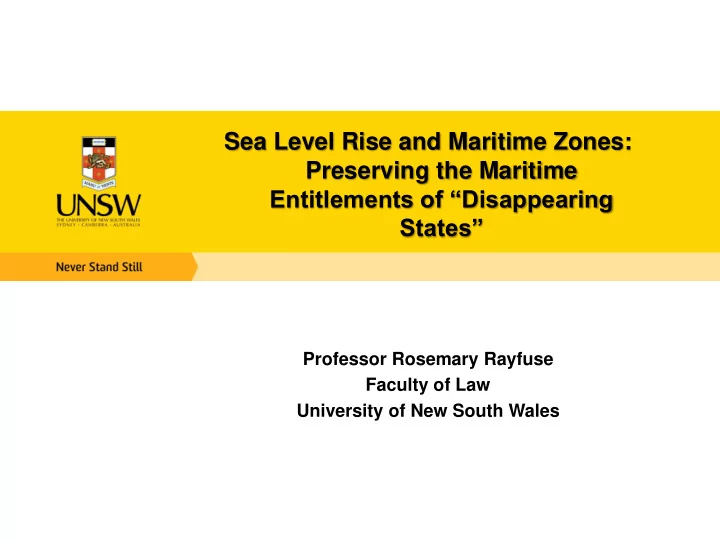

Sea Level Rise and Maritime Zones: Preserving the Maritime Entitlements of “Disappearing States” Professor Rosemary Rayfuse Faculty of Law University of New South Wales
The Basic Questions • If sea levels rise do the outer limits of a State‟s maritime zones retreat? • If an island becomes uninhabitable does it lose its EEZ and continental shelf? • If an island disappears does it lose all its maritime zones? • If an island State ceases to be inhabitable does it cease to be State? • How can the international law assist in providing stability, certainty and a future to disappearing Small Island States?
The Baseline Dilemma • The ambulatory nature of baselines • Permanent inundation of low-tide elevations and fringing reefs used as basepoints will move the outer limits • „Rocks which cannot sustain human habitation or economic life of their own‟ are not entitled to an EEZ or continental shelf • Islands that disappear may cease to generate any maritime zones
The Statehood Dilemma • Criteria for Statehood (Montevideo Convention): – Permanent population – Defined territory – Government – Capacity to enter into relations with other States • Loss of population and/or territory renders state non-existent • Only States can claim maritime zones, therefore when a State ceases to exist, maritime zones cease and may revert to global commons or to other States
Resolving the Statehood Dilemma • Disappearing State acquires new territory by cession • Disappearing State merges into some form of federation with other State • Recognition of new category of State – the deterritorialised State
Deterritorialised States Concept already recognized in international law – Knights of Malta – Papal See Functional or non-territorial sovereignty also recognized – Governments in exile – Communities made diasporic though invasion and colonisation – Communities overrun and internally dislocated or formally deteritorrialised Rights of „entities‟ also recognized – European Union – Taiwan
Disappearing States as Deterritorialised States • Governed by „government‟ or „authority‟ elected by registered voters • „Government‟ acts as trustee of State assets for benefit of citizens wherever they might be located • Maritime zones continue to inure to the State • Resource rents from maritime zones (fishing, sea-bed mining etc) used to fund the relocation and continued livelihood of displaced population – whether diasporic or all located in one new „host‟ State • „Government‟ continues to represent deterritorialised State at the international level to ensure and preserve the trust „property‟ and to ensure rights and interests of its citizens vis - a-vis their new host State or States
Resolving the Baseline Dilemma: Options under Existing Law • LOSC Article 5 – fix zones by marking low-water line on officially recognised charts • Increased use of straight baselines (to be used with caution) • Establishment of outer limits of continental shelf where appropriate • Bilateral maritime boundary delimitation agreements • LOSC Article 5 & Article 16(1): declare baselines by recourse to geographical coordinates - may require amendment of domestic legislation especially in the Pacific
Resolving the Baseline Dilemma: New International Approaches Substantive questions: – Freezing baselines vs freezing outer limits – The time from which the baselines are frozen Procedural mechanisms: • Develop customary international law • Protocol to UNFCCC • Modify the Law of the Sea Convention by: – Formal amendment of LOSC – Decision of SPLOS – Supplementary agreement » Adopted by SPLOS initiative » Separate conference (ie Fish Stocks approach) » UNGA Resolution (ie PART XI approach)
Preserving Maritime Entitlements • Declare baselines in accordance with the LOSC and deposit the geographical coordinates with the UN • Permanently establish outer limits of the continental shelf • Delimit maritime boundaries with other states by treaty (defined by geographical coordinates) • Promote adoption by the international community of a new rule that freezes baselines drawn in accordance with LOSC as permanent from the time they are publicly declared
Thank You
Recommend
More recommend